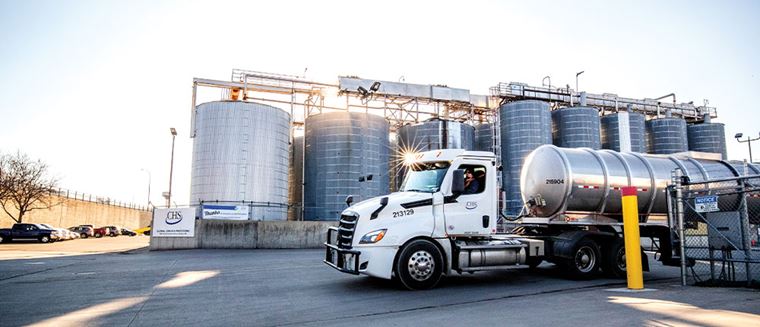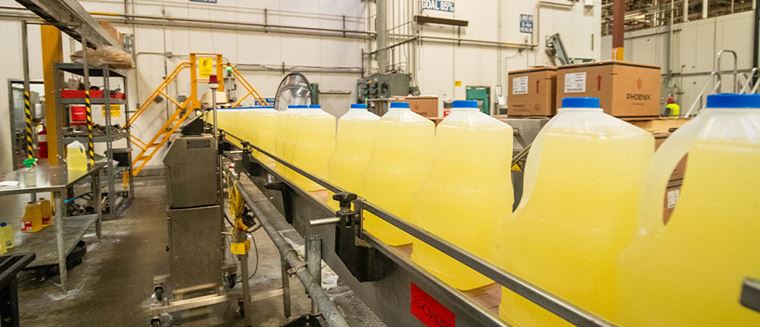You may not notice branded Ventura Foods products, made mostly from soy oil, on grocery store shelves or highlighted on restaurant menus. But the company is a big player in the food industry, which benefits farmers.
Ventura Foods – a California-based joint venture between CHS and Mitsui & Co. – manufactures packaged food products for the food industry. Customers include some of the largest restaurants, grocery stores and food service providers, including 70 of the top 100 restaurant chains in America.
The company makes popping and butter-flavored topping oils used in movie theaters and sports arenas. Restaurants use Ventura Foods frying oils to make crisp and tasty foods. Its sauces, dips and dressings complement culinary creations. Ventura Foods also manufactures margarines, butter blends, spreads, mayonnaises, pan sprays and culinary bases that help chefs create recipes to tantalize taste buds.
“We’re a custom company more than a branded one,” says Chris Furman, Ventura Foods president and CEO. “If you go to the back of a restaurant and the chef is using fry oil or mayonnaise, it may be manufactured by Ventura Foods.”
The company concentrates resources on its innovation center, manufacturing plants and employees, and improving its supply chain rather than on branding.
“That’s really where our greatest strengths are and that’s why we continue to do well by developing the foodservice side of our business,” Furman says.
The strategy has helped Ventura Foods grow, driving oilseed demand.

Strong partnership
Ventura Foods revenues have increased by about $1 billion in the past decade to nearly $4 billion in fiscal year 2023, which ended March 31, 2023. That growth benefits CHS farmer-owners in multiple ways.
Ventura Foods is a strong, consistent buyer of soybean oil and canola oil. The company annually purchases about 25% of the refined, bleached and deodorized soy oil, 15% to 20% of the high-oleic soy oil and 15% of the canola oil produced by CHS facilities.
Co-owning Ventura Foods directly connects CHS farmer-owners to the food supply chain, says Todd Biedenfeld, director of vegetable oil and sunflower sales with CHS.
“CHS has had incredible returns from our soy and canola processing businesses over the last few years and Ventura Foods is a large contributor to that success,” he says. “Rewards to owners traditionally end when we ship out the refined oil and meal from our facilities. Owning 50% of Ventura Foods allows CHS to participate more completely in the supply chain and when Ventura Foods is profitable, we share in that success. Ultimately, it allows us to return more money to farmer-owners.”
Furman adds the joint venture is successful due to the shared values of CHS and Mitsui. “The mutual respect and collaborative spirit are evident. I’ve had a front-row seat for 14 years, watching leaders of both companies work together to solve challenges.”

Soy strength
Edible oils are the main ingredients in Ventura Foods products. The company annually uses 2 billion pounds of edible oils derived from soybeans, canola, palm, cottonseed, corn, peanuts, coconuts, olives and other plant sources. Soy oil accounts for 65% to 75% of the company’s oil use, Furman says. The company sources oil from CHS and other large suppliers throughout the world.
Ahmad Popal, senior vice president of food innovation and international with Ventura Foods, says soy oil is the primary ingredient because of availability and price and because it’s an “excellent carrier for texture and flavor.”
Ventura Foods is the largest oil customer for CHS, Biedenfeld says. CHS oils are shipped via rail and truck from refineries in Mankato, Minn., and Hallock, Minn., to 11 Ventura Foods plants nationwide.
About Ventura Foods
Formed in 1996 as a joint venture between CHS and Mitsui & Co. following the merger of Wilsey Foods and Holsum Foods. Learn more about Ventura Foods.
Locations
- Brea, Calif. (headquarters)
- Birmingham, Ala.
- Ontario, Calif.
- Port St. Lucie, Fla.
- Thorton, Ill.
- Opelousas, La.
- Albert Lea, Minn.
- St. Joseph, Mo.
- Portland, Ore.
- Salem, Ore.
- Chambersburg, Pa.
- Fort Worth, Texas
- Saginaw, Texas
- Waukesha, Wis.
- Edmonton, Alberta
- Toronto, Ontario
Selected brands
- Hidden Valley
- Classic Gourmet
- SunGlow
- Sauce Craft
- Chef’s Pride
- Grandioso
- LouAna
- Gold-n-Sweet
- Smart Balance
“The beautiful thing about the joint venture is the two owners allow Ventura Foods to operate with autonomy to make business decisions in the best interests of the company,” Furman says. “Mitsui encourages us to do business with CHS, assuming we’re making the right decisions based on market conditions.”
Darin Johnson, who farms with his family near Wells, Minn., sells about 100,000 bushels of soybeans annually to the CHS crush plant in nearby Fairmont, Minn. Soy oil produced in Fairmont is further refined at the CHS soy processing facility in Mankato, which ships oil to Ventura Foods and other customers.
“Soy oil demand and value the past two years have been amazing. For farmers, it adds to our bottom line,” Johnson says. “We know renewable fuels feedstock demand adds nearly $1 per bushel to the price of soybeans and I think the food oil side of it adds just as much, if not more.”
He expects soybean acres to increase to satisfy oil needs.
Adapt and grow
The COVID-19 pandemic hit Ventura Foods hard. Sales plummeted when restaurants, schools and other customers were forced to close dining rooms.
The pandemic changed consumer behavior, says Furman. Demand for food delivery and takeout meals skyrocketed. Traditional dine-in restaurants, which didn’t have drive-thru windows and little takeout business, needed to change to survive.
During the pandemic, Ventura Foods worked with restaurants to create a campaign called The Great American Takeout. “We adjusted to the changes with more packaging offerings geared toward takeout and delivery,” Furman says, including more single-serving dips, dressings, sauces and margarines.
Before the pandemic, the company worked to increase and diversify its customer base to bolster long-term success. More than a decade ago, all its clients were in the U.S. and one customer accounted for more than 25% of Ventura Foods revenues. Now its customer base is spread throughout North America, Latin America and Asia.
“Our company is stronger, more focused on growth and more balanced. We’re more diversified in our approach to the marketplace,” Furman says.
In the future, he says, Ventura Foods plans to partner with customers in more robust ways, accelerating adoption of technology to support growth and the customer experience.
Food vs. fuel
Furman says he expects competition for soy oil, the primary feedstock of renewable diesel and biodiesel, to intensify between the food and fuel industries.
Though heightened competition is a concern, Furman anticipates Ventura Foods will be able to acquire the soy oil it needs.
“We’re working with our major soybean oil suppliers to solidify our place in their portfolio,” he says. “We are a proven, time-tested source of demand soybean and canola crushers can rely on.”
Biedenfeld agrees a paradigm shift in soy oil demand is occurring with growing demand for renewable diesel. CHS currently sells 80% of its soy oil to food companies and the rest for fuel and industrial uses.
“We assume our percentages [of soybean oil sales] will change in the future, but with our joint venture in Ventura Foods, CHS is dedicated to staying loyal to the food side of the market,” he says.
Check out the full Winter 2024 C magazine with this article and more.




